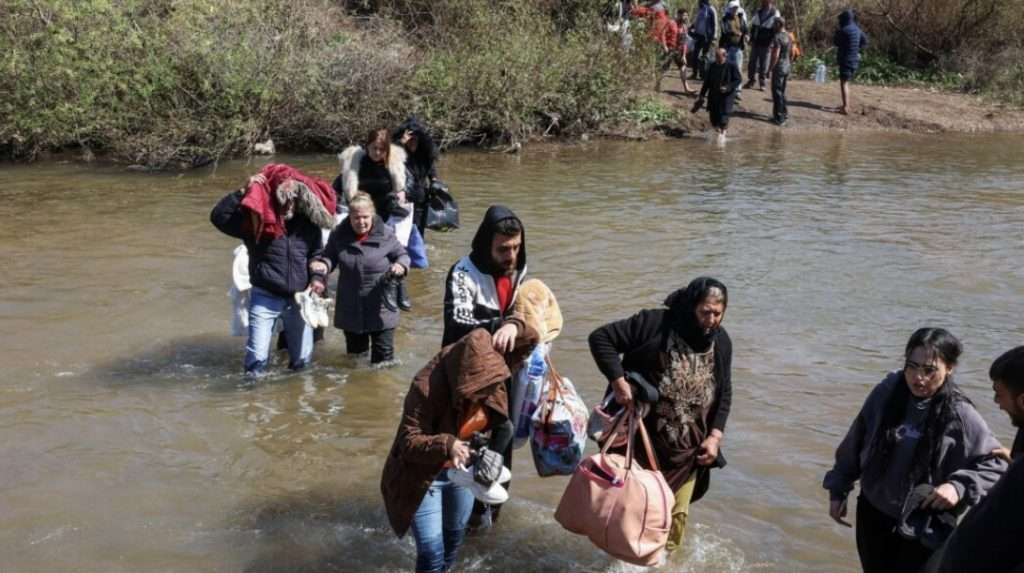1,400 killed in Syrian sectarian violence, investigation finds

Earlier this year, over 1,400 people – mostly civilians – were killed in several days of sectarian clashes along Syria’s coast, according to France24 via AP on July 22nd.
This information comes from a government committee assigned to investigate the issue.
This marked the first major outbreak of violence since longtime President Bashar Assad was ousted in December. The committee stated that there was no evidence that the new military leaders of Syria ordered assaults on the Alawites.
Over the course of its four-month investigation, almost 300 individuals accused of crimes such as murder, robbery, torture, looting, and arson targeting homes and businesses were identified and referred for prosecution. Officials reported that 37 arrests had been made but did not clarify how many of the suspects were affiliated with the security forces.
The release of the committee’s findings comes as Syria once again grappled with sectarian violence in the south, further threatening the nation’s recovery from almost 14 years of civil war.
According to the committee, the coastal violence erupted on March 6th when pro-Assad armed groups launched attacks on the new government’s security forces, resulting in the deaths of 238 personnel.
In retaliation, security forces from across the country deployed to the coast, accompanied by thousands of armed civilians. Altogether, around 200,000 armed individuals were mobilised, the committee reported.
As these forces entered towns and neighborhoods, some- including members of military factions- carried out “widespread, serious violations against civilians,” committee spokesperson Yasser al-Farhan stated.
In certain instances, civilians were questioned about their affiliation with the Alawite sect, and “committed violations based on this,” the spokesperson added.
However, the committee concluded that “sectarian motives were mostly based on revenge, not ideology,” he noted.
Judge Jumaa al-Anzi, the committee’s chair, emphasised that “we have no evidence that the [military] leaders gave orders to commit violations.”
He also mentioned that investigators had not received reports of girls or women being kidnapped, although some human rights groups, including a UN commission, have reported cases involving the abduction of Alawite women in the aftermath of the violence.
There have been continued, athough sporadic, reports of Alawites being killed, robbed, or extorted since the unrest. Tens of thousands from the minority sect have fled to neighboring Lebanon. Recent fighting in the southern Sweida area has echoed the earlier coastal violence.
In recent weeks, clashes have erupted between Sunni Muslim Bedouin clans and armed factions of the Druze religious minority. Government security forces, who intervened to quell the conflict, ultimately sided with the Bedouins. Security forces allegedly killed Druze civilians and looted and burned homes. In retaliation, Druze militias launched attacks on Bedouin communities.
Hundreds of people have been killed, and the UN reports that over 128,500 have been displaced. The violence has mostly subsided following a ceasefire.
The US-brokered ceasefire agreement was reached between Syria’s interim President Ahmed al-Sharaa and Israeli Prime Minister Benjamin Netanyahu. US envoy Tom Barrack confirmed that both Turkey and Jordan backed the deal. Barrack called on Druze, Bedouins, and Sunnis to disarm and work toward a unified and peaceful Syrian identity.
The committee chair described the Sweida violence as “painful for all Syrians” but stated it was “beyond the jurisdiction” of the committee.
“Time will reveal what happened and who is responsible for it,” he added.
France24 via AP, Maghrebi.org
Want to chase the pulse of North Africa?
Subscribe to receive our FREE weekly PDF magazine













